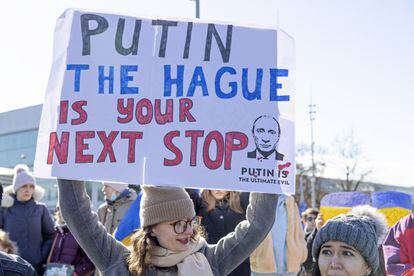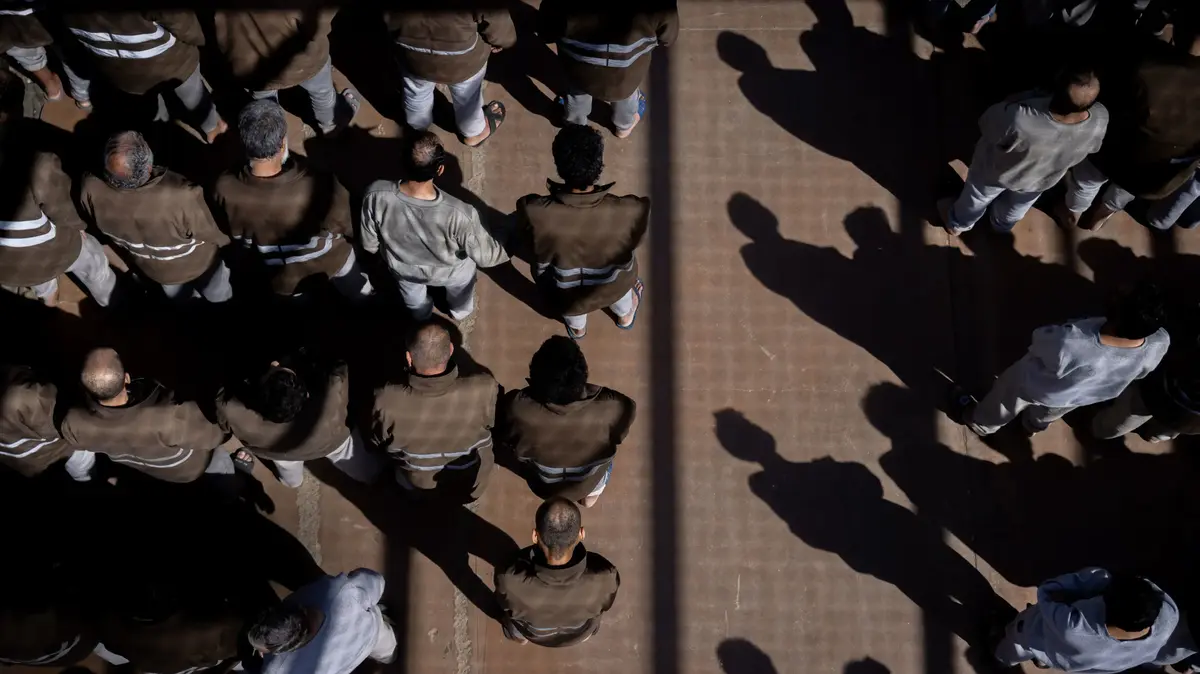A woman raises a poster against Vladimir Putin, on February 26 during a protest in Geneva. SALVATORE DI NOLFI (EFE)
The invasion of Ukraine ordered by Russian President Vladimir Putin constitutes a crime of aggression against a state, according to international law.
As civilian deaths rise;
when the exodus of refugees already affects 1.5 million Ukrainians;
The International Criminal Court (ICC), the judicial instance empowered since 2018 to judge this type of act, still does not intervene.
Why don't you act?
The answer is as simple as it is discouraging: Ukraine and Russia are not among its members.
They have not ratified the founding text of this court, the Rome Statute, and the judges have their hands tied.
It could intervene if the United Nations Security Council referred the case to the ICC Prosecutor's Office.
On paper, it is a possibility, but it is also ruled out:
Outside the list of members of the ICC, Russia has turned its back this Monday on another judicial forum, the United Nations International Court of Justice (ICJ).
Dedicated to resolving disputes between states, its judges are already studying the demand presented by Ukraine “to stop Russian military activity” in their country.
At the first hearing, held this Monday in the Dutch city of The Hague, its official headquarters, the lawyers of the Russian side have not appeared.
With the war already underway, Kiev invoked the Convention for the Prevention and Punishment of the Crime of Genocide (1948) -of which it is a party, as is Russia- and asked the judges to issue precautionary measures in an attempt to stop the tragedy.
Ukraine also alleges that, in order to justify the invasion,
The decisions of the UN court are binding on both parties, but this body lacks the power to enforce compliance.
The Russian absence, with its empty seats in the foreground, is a way of "undermining the legitimacy of the process and discrediting the future judicial decision," explains Daniel Peat, assistant professor of Public International Law at the University of Leiden.
If the precautionary measures are issued, and then the judges analyze the distortion of the notion of genocide denounced by Kiev, it would serve "to demonstrate before a world forum of this caliber that a genocide has not been committed in the Donbas region", as holds Moscow.
Since the TIJ is not a criminal court, its resolutions lack practical effects when it comes to putting those responsible for the invasion in the dock.
With a trial for aggression before international criminal justice ruled out for the time being, Ursula von der Leyen, president of the European Commission, called this Sunday for a "solid and clear investigation" into possible war crimes committed in Ukraine.
To date, they have seen everything from attacks on cities and civilian casualties to the use of cluster bombs.
Both fit into the notion of war crimes.
Crimes against humanity may have been perpetrated in turn.
Ukraine did accept in 2015 the partial competence of the ICC to investigate the crimes that occurred in Donbas since February 2014. This, together with the fact that 39 member countries of this instance -including Spain- asked Karim Kahn, its chief prosecutor , which launches such an investigation, has resulted in the dispatch of a specialized team to Ukraine.
Its task is to document what is happening, and it marks the beginning of a long process of attribution to those most responsible throughout the chain of command.
In theory, it could reach Putin, since this court does not take into account the immunity of political or military leaders.
Not even from heads of state.
But proving beyond all reasonable doubt his direct authorship would not be easy for international justice either.
For Frans Osinga, Professor of War Studies at the Dutch University of Leiden, we are witnessing a conflagration of attrition in Ukraine.
“What we see is a different military operation than those undertaken by Western powers in the last thirty years, which have tried to limit civilian casualties and collateral damage.
Of course, they have not always succeeded, but in the Russian case cities are deliberately attacked, and that is a war crime”, he explains, in a telephone conversation.
In his opinion, the Russian high command can claim that it was looking for Ukrainian troops hiding in civilian buildings, and therefore the artillery cannot be selective.
“But they know that in those types of premeditated assaults they will cause casualties among the population, and this contravenes the laws of war.”
The images captured by the international media show the destruction of cities, and the population hidden in the subway and in the basement of hospitals.
“We have also seen the launch of missiles against homes, the city of Mariupol subjected to indiscriminate attacks by Russian artillery, and the use of cluster bombs.
That is a war crime,” says Lachezar Yanev, assistant professor of criminal law at the Vrije Universiteit (Free University) in Amsterdam.
This expert is skeptical, for now, with the crimes against humanity, also investigated by the ICC prosecution.
“Things are going very fast and there are signs that they may have been committed.
In this case, it must be proven that Russia has carried out a widespread or systematic attack against civilians.
It's possible, we'll see
Yanev indicates that, if successful, a case for war crimes or crimes against humanity at the ICC will take time.
Evidence must be collected and attributed to each of the alleged perpetrators.
It is necessary to request an arrest warrant from the judges and wait for one of the 123 member states of the court to arrest the suspects.
“Although years can pass between one thing and another, here one does not judge in absentia.
An arrest warrant would clearly affect the lives and movements of those identified, because the ICC is not obliged to respect the immunity of a head of state”, he recalls.
The creation of a special court to punish the crime of aggression would overcome the limitations of the powers of the ICC.
Gordon Brown, a former British prime minister, raised it last week in London and the idea has the support of Dmitro Kuleba, Ukraine's foreign minister.
“We must bear in mind that this type of court would require a resolution from the United Nations Security Council, and the approval of Russia, one of its permanent members.
Or at least, of their abstention”, says Lachezar Yanev.
Therefore, it is not clear that the creation of a special court is a more realistic option than taking the case to the International Criminal Court itself.
“To deal with aggression, I think a regime change is needed in Moscow.
So, the ICC would be just as useful as a special court,” says Yanev.
Despite the difficulties, the fact that possible war crimes committed during the invasion of Ukraine are being investigated is in itself a substantial development.
“Look at the distance that Putin maintains with his advisers.
That infinite table.
Authoritarian leaders know that their main problem is survival.
That is why, although I believe that it will be impossible to prosecute the Russian president without a change of regime, that international justice can hold them responsible for his acts is important from a moral, political and symbolic point of view”, concludes Frans Osinga.
Follow all the international information on
and
, or in
our weekly newsletter
.
Exclusive content for subscribers
read without limits
subscribe
I'm already a subscriber






/cloudfront-eu-central-1.images.arcpublishing.com/prisa/KMK4H4UCXODRHQ43NGOU4JTKHE.jpg)
